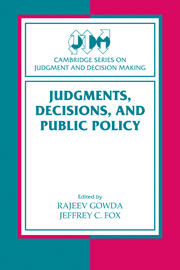Book contents
- Frontmatter
- Contents
- Contributors
- Acknowledgments
- Introduction
- Part I The Fundamentals of Behavioral Decision Theory
- 1 Judgment and Decision Making: Extrapolations and Applications
- 2 Some Morals of a Theory of Nonrational Choice
- 3 Cognition, Intuition, and Policy Guidelines
- Part II Economic Applications and Contrasts
- Part III Applications to Political and Legal Processes and Institutions
- Part IV Other Policy Applications
- Part V Commentary and Cautionary Note
- Index
2 - Some Morals of a Theory of Nonrational Choice
Published online by Cambridge University Press: 11 January 2010
- Frontmatter
- Contents
- Contributors
- Acknowledgments
- Introduction
- Part I The Fundamentals of Behavioral Decision Theory
- 1 Judgment and Decision Making: Extrapolations and Applications
- 2 Some Morals of a Theory of Nonrational Choice
- 3 Cognition, Intuition, and Policy Guidelines
- Part II Economic Applications and Contrasts
- Part III Applications to Political and Legal Processes and Institutions
- Part IV Other Policy Applications
- Part V Commentary and Cautionary Note
- Index
Summary
Individuals and organizations often have powerful incentives to shape our preferences, influence our judgments, and get us to make choices that serve their interests, whether or not they serve our own. We depend on our rational instincts, democratic institutions, and other rules and procedures to protect us from being exploited by these forces. To the ex-tent that our preferences are shaped in non-rational ways, however, and to the extent that others can find ways to bypass our rational faculties, we need to worry about our susceptibility to manipulation. If our nonrational tendencies are deep and pervasive, this worry may be justified, even when we have in place procedures and robust institutions aimed at steering us toward rational deliberation, and even when we want and try to act reasonably. This chapter is an examination of the grounds for this worry.
One of the central aims of behavioral decision theory is to discover and analyze the causal processes of preference formation. Behavioral decision theory is not a single theory but an amalgamation of findings, hypotheses, and research projects in different areas of the social sciences, which are united by their interest in discovering the empirical bases of judgment and choice. Some of the most interesting research in this area comes from psychologists who show how preferences are often determined in predictable but nonrational ways, with the implication that most of us can easily be led to make choices that we would also admit are not rationally justifiable.
- Type
- Chapter
- Information
- Judgments, Decisions, and Public Policy , pp. 46 - 70Publisher: Cambridge University PressPrint publication year: 2001



